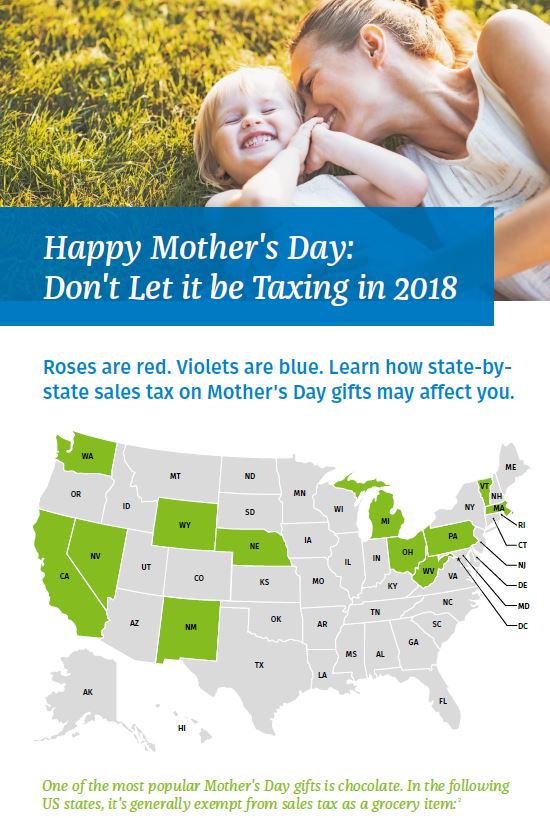Sales Tax
Mother’s Day and Sales Taxes
With Mother’s Day nearly upon us, consumers will spend an estimated $23.1 billion this year on Mother’s Day gifts and celebration, according to the National Retail Federation. Individuals will spend the week rushing out to find that perfect gift for ...
May. 10, 2018

With Mother’s Day nearly upon us, consumers will spend an estimated $23.1 billion this year on Mother’s Day gifts and celebration, according to the National Retail Federation. Individuals will spend the week rushing out to find that perfect gift for Mom, but what are the sales tax implications for businesses? It depends.
“Mother’s Day can be a major source of revenue for retailers but businesses should be mindful of the various state and local taxes and prepare accordingly,” said James Paterson, Vice President & General Manager, Corporate Indirect Segment, Wolters Kluwer Tax & Accounting North America. “A variety of factors can impact sales taxes, including the type of gift being purchased, where the retailer is located and where the consumer resides.”
Wolters Kluwer reviewed popular Mother’s Day gifts against sales taxes to identify which products will make Mother’s Day purchases bitter or sweet for businesses. Below are some key findings with additional insights found in the CCH® Sales Tax Mother’s Day infographic.
- Chocolates, one of the most popular Mother’s Day gifts, are exempt from sales tax as a grocery item in 12 states
- Consumers plan to spend $4.4 billion for Mother’s Day on special outings such as dinner or brunch, which are subject to local meals taxes in several states
- Flowers which are generally taxable, and continue to be a top Mother’s Day gift, are taxable through a variety of ways including sourcing rules specific to florists. In Alabama and Florida, if an in-state florist takes an order and then sends instructions to a second florist outside the state for delivery in that other state, the in-state florist who took the order is liable for the tax. This sourcing rule differs from the general rule that tax is owed based on where property is delivered, rather than where property is ordered. Some states exempt food-producing plants, so a nice tomato plant can be a good Mother’s Day gift alternative
Risks can happen anywhere throughout a business processes, from manufacturing and distribution, through order take and fulfillment, to collection and remittance of sales and use taxes. Follow the Wolters Kluwer Sales Tax blog to hear about the latest sales and use tax news and legislative changes, and how businesses can mitigate those risks.
